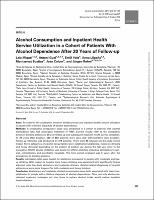| dc.contributor | Departament de Salut |
| dc.contributor.author | Miquel, Laia |
| dc.contributor.author | Gual, Antoni |
| dc.contributor.author | Lligoña, Anna |
| dc.contributor.author | Bustins, Montse |
| dc.contributor.author | Colom-Farran, Joan |
| dc.contributor.author | Rehm, Jürgen |
| dc.date.accessioned | 2022-02-11T13:48:28Z |
| dc.date.available | 2022-02-11T13:48:28Z |
| dc.date.issued | 2017-03 |
| dc.identifier.citation | Miquel L, Gual A, Vela E, Lligoña A, Bustins M, Colom J, et al. Alcohol Consumption and Inpatient Health Service Utilization in a Cohort of Patients With Alcohol Dependence After 20 Years of Follow-up. Alcohol Alcohol. 2017 Mar 9;52(2):227-233. |
| dc.identifier.issn | 1464-3502 |
| dc.identifier.uri | https://hdl.handle.net/11351/7009 |
| dc.description | Alcoholics; Therapy; Hospitalization; Cohort study |
| dc.description.abstract | Aims: To examine the association between drinking levels and inpatient health service utilization in people with a lifetime diagnosis of alcohol dependence.
Methods: A longitudinal prospective study was conducted in a cohort of patients with alcohol dependence who had undergone treatment in 1987. Current results refer to the association between drinking patterns at 20-year follow-up and subsequent inpatient health service utilization. At 20 years after baseline, 530 of 850 patients were alive with administrative data available. Follow-up interview was conducted on 378 patients. There were 88 refusals and 64 could not be traced. Three categories of alcohol consumption were established (abstainers, moderate drinkers and heavy drinkers) depending on the pattern of alcohol use during the last year prior to the evaluation. Health service utilization was based on official statistics, including admissions to general, rehabilitation and psychiatric hospitals. The time period analysed was 5 years after the assessment of drinking patterns.
Results: Admission rates were lowest for abstainers compared to people with moderate and heavy drinking. With respect to hospital days, heavy drinking was associated with significantly higher adjusted rates than both abstainers and moderate drinkers. Alcohol-related diagnoses in hospital admissions were more frequent for both moderate and heavy drinkers.
Conclusion: Abstinence and moderate alcohol consumption were both associated with lower hospitalization in people with a lifetime diagnosis of alcohol dependence. Thus, not only abstinence-oriented treatment strategies but also those to reduce alcohol intake would reduce inpatient hospitalizations.
Short Summary: Abstention and reduced drinking in lifetime alcohol-dependent patients were associated with lower health care utilization compared to heavy drinking. Alcohol treatment strategies for alcohol-dependent patients have a positive impact on the reduction in health care utilization. An increase in treatment rate for alcohol use disorders will consequently have marked population health improvements. |
| dc.language.iso | eng |
| dc.publisher | Oxford University Press |
| dc.relation.ispartofseries | Alcohol and alcoholism;52(2) |
| dc.rights | Attribution-NonCommercial-NoDerivatives 4.0 International |
| dc.rights.uri | http://creativecommons.org/licenses/by-nc-nd/4.0/ |
| dc.source | Scientia |
| dc.subject | Alcoholisme - Tractament |
| dc.subject | Alcohòlics - Estudi de casos |
| dc.subject | Alcohòlics - Rehabilitació |
| dc.subject | Alcohòlics - Assistència hospitalària - Catalunya |
| dc.subject.mesh | Alcoholism |
| dc.subject.mesh | /rehabilitation |
| dc.subject.mesh | Hospital Care |
| dc.subject.mesh | Catalonia |
| dc.title | Alcohol Consumption and Inpatient Health Service Utilization in a Cohort of Patients With Alcohol Dependence After 20 Years of Follow-up |
| dc.type | info:eu-repo/semantics/article |
| dc.identifier.doi | 10.1093/alcalc/agw075 |
| dc.subject.decs | alcoholismo |
| dc.subject.decs | /rehabilitación |
| dc.subject.decs | atención hospitalaria |
| dc.subject.decs | Cataluña |
| dc.relation.publishversion | https://doi.org/10.1093/alcalc/agw075 |
| dc.type.version | info:eu-repo/semantics/publishedVersion |
| dc.audience | Professionals |
| dc.contributor.authoraffiliation | [Miquel L, Gual A] Grup de Recerca en Addiccions Clínic, Institut Clínic de Neurosciències, Universitat de Barcelona, Barcelona, Spain. Institut d'Investigacions Biomèdiques Agustí Pi i Sunyer, IDIBAPS, Barcelona, Spain. Spanish Network of Addictive Disorders (RTA). RETICS, Sinesio Delgado, Madrid, Spain. [Vela E, Bustins M] Divisió d'Anàlisi de la Demanda i l'Activitat, Servei Català de la Salut, Departament de Salut, Generalitat de Catalunya, Barcelona, Spain. [Lligoña A] Grup de Recerca en Addiccions Clínic, Institut Clínic de Neurosciències, Universitat de Barcelona, Barcelona, Spain. Spanish Network of Addictive Disorders (RTA). RETICS, Sinesio Delgado, Madrid, Spain. [Colom J] Programa sobre Abús de Substàncies, Agència de Salut Pública de Catalunya, Departament de Salut, Generalitat de Catalunya, Barcelona, Spain. [Rehm J] Social and Epidemiological Research (SER) Department, Centre for Addiction and Mental Health (CAMH), Toronto, Canada. Dalla Lana School of Public Health, University of Toronto, Toronto, Canada. Department of Psychiatry, Faculty of Medicine, University of Toronto, Toronto, Canada. PAHO/WHO Collaborating Centre for Addiction and Mental Health, Toronto, Canada. Epidemiological Research Unit, Klinische Psychologie & Psychotherapie, Technische Universität Dresden, Dresden, Germany |
| dc.identifier.pmid | 28182212 |
| dc.rights.accessrights | info:eu-repo/semantics/openAccess |

